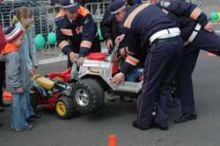In the past few years Ukrainian roads have become a mortal danger to people. Traffic police report that in 2007 alone 62,000 accidents claimed over 9,000 human lives and left 77,000 people injured. Nobody is safe from the threat of being injured or killed, whether they are motorists, those who use public transport, including trolleybuses or express minibuses, bicyclists, pedestrians, and children. The Ukrainian government has made many attempts to solve this long-standing problem: suffice it to recall the president’s decree to abolish DAI, the State Traffic Inspection Agency, a few years ago and what this led to.
Today you can see traffic policemen on every corner: the DAI administration calls this “broad operative and preventive measures.” Inspectors catch bad drivers, confiscate their driver’s licenses, draw up reports, and take them to court.
Meanwhile, our courts are bursting at the seams, and judges are going to administer summary justice. This will last until at least Feb. 10, when the number of highway patrolmen will be increased. Since the DAI intends to carry out such campaigns on a regular basis, there are fears that, in an attempt to get rid of the inspectors, drivers will be giving them larger bribes and continuing to drive as they please. Security cameras on roads and checkpoints are one of the measures that could help increase discipline among both drivers and policemen, but the DAI has delayed this indefinitely and is resorting to the old carrot-and-stick method.
It would also be a good idea to toughen driver certification, like in Poland, and introduce new teaching methods. Meanwhile, nobody is considering this in Ukraine, where it is cheaper to buy a driver’s license than take a driving course.
According to DAI chief Serhii Kolomiiets, there are about 6,000 traffic policemen patrolling the roads. Since Jan. 10 they have recorded 70,000 infractions (31,000 of which led to accidents) and nabbed about 7,000 drunk drivers. The positive result is a 19- percent drop in accidents. But will this situation last?
Like before, the main cause of accidents is that both drivers and pedestrians flout traffic rules.
Policemen say that the punishment for traffic infractions is too light in Ukraine. The minimum fine is 8 to 17 hryvnias. In order to curb reckless drivers, experts suggest increasing fines for traffic violations, which is the subject of a bill to introduce amendments to the nine traffic-regulation legislative acts, now under consideration in the Verkhovna Rada.
Once the bill is voted into law, the minimum fine will jump to 85- 100 hryvnias. To increase the liability of drivers, experts suggest a 170-hryvnia fine for such serious offenses as incorrectly crossing an intersection and running a red light, and a 1,360-to-1,700-hryvnia fine for drunk driving. Systematic infractions of traffic rules will entail a fine of 2,040 to 2,750 hryvnias and penalty points will be awarded to drivers. If a driver earns 30-40 points in one year, DAI inspectors will be authorized to impound his/her driver’s license.
“Under the law, DAI inspectors can only confiscate driver’s licenses if someone has passed through a grade crossing incorrectly, a potential accident situation has been created on the road (when other motorists have to speed up or switch directions), when a driver has left the scene of an accident, or the driver is drunk,” explains Oleksandr Savchenko, Deputy Interior Minister of Ukraine. “After amendments were introduced to the traffic-control law, the clause on confiscating licenses pending a court order on the size of the fine is still in effect. If a motorist is unable to pay the fine right after the court has announced its decision, the DAI will impound the vehicle until the fine is paid.”
Apart from establishing mobile units, the DAI also intends “to activate all its services” and “cooperate with the courts.” But have they visited a court recently? If there is such a clause, it would be good to establish this type of “cooperation.”
COMMENTARY
Andrii KHOROLSKY, vice-president, Kyiv Automobile Club:
“Increasing fines for traffic infractions will be good for drivers. They will be more disciplined and responsible because the current situation on the roads is catastrophic, and small fines only increase permissiveness among motorists.
“I think that confiscating a driver’s license pending a court order, which is being done now, is absurd because a driver sometimes has to wait months for a court ruling. In my opinion, this is a violation of the state’s democratic principles and human rights in general. More often than not, courts hear cases one-sidedly: they only try to draw up a report and hand down a ruling without a lawyer, a third party, or witnesses. They stick to the silly Soviet principle of tabulating statistics and reporting to their bosses as soon as possible.
“The solution is simple. When a law is announced or a law must be upheld, all DAI inspectors must be compelled to comply with it. As for fines, they should be commensurate with the gravity of a driver’s infraction. If an accident affects not only vehicles on the road but pedestrians as well (very often cars hurtle onto sidewalks), the fine should include all damages. To improve the situation on the roads, we should also upgrade training for traffic inspectors and instill discipline and respect for them on the part of drivers.”







